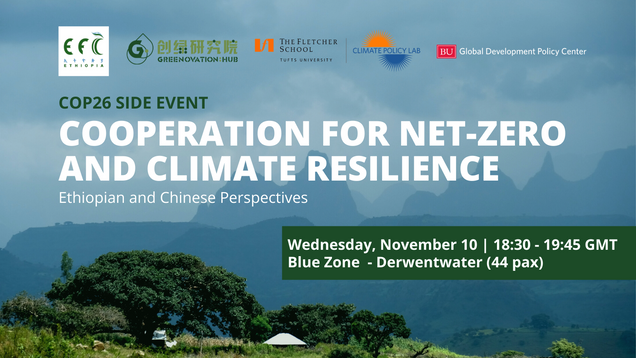GDP Center Round Up: UN Climate Change Conference (COP26) – Week One

From October 31-November 12, the 2021 United Nations Climate Change Conference, also known as COP26, will take place in Glasgow, Scotland. The summit seeks to bring parties together to accelerate action towards the goals of the Paris Agreement and the UN Framework Convention on Climate Change. World leaders, policymakers, researchers, journalists, activists and others will be on the scene to interact, engage and discuss the global climate crisis and next steps for the international community. Delayed due to the COVID-19 pandemic, the meeting has been called “by far the most important gathering on climate change since nearly 200 countries adopted the Paris Agreement in 2015.”
Announcements and further climate commitments are expected during the summit, with India already announcing a commitment to reach net-zero by 2070, and a formal declaration is expected at the conclusion of the conference.
As the international community gathers in Glasgow, the Boston University Global Development Policy Center has produced a suite of research aimed at supporting a global, green and just transition. See highlights from our latest research below and read the Week Two Roundup:
Lights On: The State of International Development Finance, Coal and Green Energy

In the year since development finance institutions (DFIs) pledged to align their financing with the goals of the Paris Agreement, the landscape of development finance has shifted dramatically in favor of developing countries with green energy transition goals, particularly since the G20 pledge on October 31, 2021 to end finance for overseas coal. As a result, a new policy brief finds that as of November 1, 2021, every major DFI that lends internationally has committed to ramping up support for green energy, with 99 percent of internationally available development finance committed to reducing or ending coal finance support and increasing support for renewable energy. The authors chart the commitments made to date across DFIs, analyzing how they affect the scope of available development finance and outlining policy recommendations for borrowers and lenders alike. Read the policy brief.
The Case for a New Bretton Woods

Despite the wake-up call of the 2008 global financial crisis, the institutions tasked with governing the world economy – the International Monetary Fund and the World Bank – have failed to promote stability, social inclusion and sustainability. After the crash, reforms were promised but not delivered, and, as a result, the global economic situation, marred by inequality, volatility and climate breakdown, remains dysfunctional. Now, the economic fallout from the COVID-19 pandemic offers a second chance. In a forthcoming book, Kevin P. Gallagher and Richard Kozul-Wright argue that it must be grasped by implementing sweeping reforms to how global money, finance and trade are governed. Without global leaders prepared to boldly rewrite the rules to promote a prosperous, they argue a just and sustainable post-COVID-19 world economic order – a Bretton Woods moment for the 21st century – the future will look even darker than the present. Pre-order the book.
Debt Relief for a Green and Inclusive Recovery
On October 27, 2021, the Vulnerable Group of 20 (V20) released a statement calling for debt restructuring options for climate vulnerable countries. Their statement noted that climate vulnerability is driving up the cost of capital and undermining debt sustainability, which in turn impedes investment in development and resilience. Their statement highlighted that, in order to be effective, debt restructuring would need to be “a concerted effort by multilateral agencies such as the World Bank Group and regional multilateral development banks to act as guarantors of restructured debt through guarantee facilities for inclusive, sustainable and resilient recovery efforts.” One possible format for such an initiative could be drawn from the recent proposal produced by the Boston University Global Development Policy Center, Heinrich Boëll Foundation and Centre for Sustainable Finance at SOAS, University of London, which lays out a blueprint for comprehensive debt relief that would free up significant resources for countries to mount green and inclusive recoveries and achieve their climate and development goals. Watch the video and read the report.
Accelerated Shifts in Terrestrial Life Zones under Rapid Climate Change

Rapid climate change is impacting biodiversity, ecosystem function and human well-being. A new journal article published in Global Change Biology by Blake Alexander Simmons and coauthors uses high-resolution historical climatologies and climate projections to determine the global distribution of historical (1901-1920), contemporary (1979-2013) and future (2061-2080) life zones, finding that changes from one life zone to another during the 20th century impacted 27 million km2 (18.3 percent of land), with consequences for social and ecological systems. Such changes took place in all biomes, most notably in boreal forests, temperate coniferous forests and tropical coniferous forests. Additionally, the projections show the pace of life zone changes is accelerating rapidly in the 21st century. The authors say the accelerated pace will increasingly challenge adaptive conservation and sustainable development strategies that incorrectly assume current ecological patterns and livelihood provisioning systems will persist. Read the journal article.
The Task Force on Climate, Development and the International Monetary Fund Playlist
The Task Force on Climate, Development and the International Monetary Fund is a consortium of experts from around the world convened to support the Intergovernmental Group of Twenty-Four (G24) and the Vulnerable Group of Twenty (V20) Ministers of Finance, IMF management and staff, and key stakeholders to advance a development-centered approach to climate change at the IMF. In this YouTube playlist, Task Force experts share their insights and expertise on the connection between climate and development, spillover risks, climate resilience, IMF surveillance and more. Watch the playlist.
Cooperation for Net-Zero and Climate Resilience: Ethiopian and Chinese Perspectives
From the national to the international level, how can developing countries leverage development finance to accelerate climate actions and sustainable development? What will China’s announcement mean for achieving global climate and development goals? And how can the national and international community work together for climate resilience and cooperation? On Wednesday, November 10, join experts from the Boston University Global Development Policy Center, the Ethiopian Environment, Forest and Climate Change Commission, Greenovation Hub and the Tufts University Climate Policy Lab for a COP26 side event discussion on coal, climate resilience and cooperation, with insights from Ethiopia and China’s overseas development finance. Watch the recording.
Make or Break? Mainstreaming Climate Policy at the IMF
With its universal role and influence over economic policy, the International Monetary Fund (IMF) can make or break countries’ COP26-related commitments. This raises questions such as, how should the Fund mainstream climate change policy into its work? Capitalizing on the COP26, what priorities should shape the IMF’s new climate strategy? And how can developing countries ensure the Fund’s approach protects a green and inclusive recovery? On Thursday, November 18 from 9:30:10:45 AM ET, join the Boston University Global Development Policy Center and Recourse for an expert webinar discussion on the role of the IMF in responding to the global climate crisis. Register to attend.
Read the Week Two Roundup
Never miss an update: subscribe to updates.

